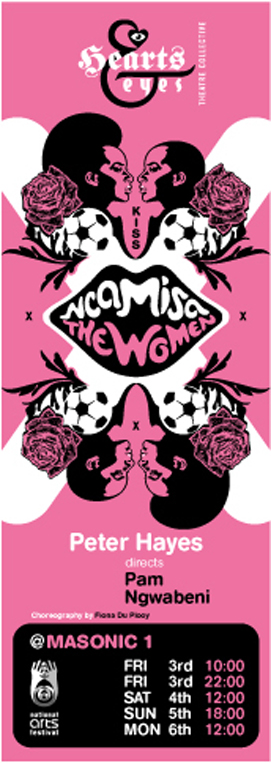Written and directed by: Peter Hayes, Hearts and Eyes Theatre
Performed by: Pam Ngwabeni
Choreographed by: Fiona du Plooy
AWARD: Intercultural Dialogue Award at The seventh International Dublin Gay
Theatre Festival
Winner: Hearts and Eyes Theatre Company for Ncamisa! Kiss the Women and The Tricky Part (South Africa)
Presented by HEARTS & EYES THEATRE COLLECTIVE,
Cape Town, SOUTH AFRICA
Allowing access to real stories and issues
Life as a gay woman in the townships
June 15, 2009 Edition 1
Lucinda Jolly
TRANSLATED from isiXhosa as “kiss the woman”, Ncamisa is a play about gay women’s experiences in the townships. It will be performed in Grahamstown at Masonic One from July 3 to 6, and will be previewed at the Intimate Theatre on June 27.
The production is directed and written by Peter Hayes of the Hearts and Eyes theatre company. The play stars Nombulelo Ngwabeni (Pam) who, with Hayes, workshopped it from her experiences as a gay woman living in Khayelitsha.
Hayes has been wanting to do a gay women play since 1997. A gay man wanting to do a lesbian play? He laughs “I’m a total dyke dude!”
In 2008 Hayes went to Canada with a play called Tricky Part – “not a gay play” he adds. But the search since has been for “a project with passion but without needing too much money.
“Why did I need to tell a gay African story when so many are dying in South Africa?” He answers his own question. Hayes was “totally shocked at the lack of outrage at Zoliswa Nkonyana’s murder in 2006.” He emphasises that “When Matthew Shepard was murdered there was protest right across America. And this is happening on our doorstep!”
The idea of doing a township lesbian play became a reality when Hayes met Ngwabeni through Jaqueline Dommisse, Hayes’s theatre partner and Ngwabeni’s teacher at Arts and Media Access Centre (AMAC).
“Finding an actor excited about the project and brave enough to tackle the project was incredibly rare. I needed a black actor to allow access to real stories,” explains Hayes.
Although Ngwabeni tells me that there are no happy stories in the township lesbian scenario, Hayes counteracts this, saying, “theatre has the ability to show a potential world and – “please God” he pleads, laughing, “that there are some rainbows!”
Interestingly, acting is not Ngwabeni’s first love. She always wanted to be a writer. She says so many stories are still untold. Her voice lecturer advised her that, “if people don’t write a story for you, go and write a story and cast yourself. ”
I ask her about Zoliswa Nkonyana the young lesbian murdered in 2006. They were close friends. Around the time of her murder, Zoliswa had been hanging out with Ngwabeni in Gugulethu but her mother kept phoning to try to get her to go home.
Later when she was walking home from a tavern in Khayelitsha, six men beat her to death because of her sexual orientation. Some of the men have been released from prison. I ask if Ngwabeni is afraid. She says that she is not afraid for herself, and that “there is nothing wrong with being me”. Ironically, she points out that Khayelitsha has been safer since the murder.
Although the play doesn’t look at politics in its narrowest form, it reflects how the history of apartheid has affected us South Africans.
Hayes describes Ncamisa as a play that is ” woven together with soccer and song”. He works with stereotype, ambiguity, perception and misperception. “I love leading an audience down a path that suddenly disappears” he says.
In the place of a single narrative, Ncamisa is constructed from three main episodes. It starts with Ngwabeni’s life as a lesbian in Khayelitsha, which is followed by an exploration of Zoliswa’s life and the final episode is a celebration.
“Anybody who is gay or has gay friends will absolutely recognise these prisms”, says Hayes.
His western approach to theatre couples with that of the community actor to produce a “very funny, very hopeful piece”
The opening scene is of Ngwabeni playing soccer. She also does the tango and contemporary dance and sings original and cover songs and opera. Jennifer Ferguson has written a song specially for the play. The atmosphere is created using astroturf and linoleum and hand-held lights.
Hayes explains that Ncamisa is required to educate and entertain a middle class audience. He is insistent that this is to be a prestigious event – not a community affair or a fringe event. “I want you to come to a sophisticated play”.
Although this is not a heavy play, it deals with profound issues
Ncasmisa! Kiss the Women calls shame on South Africa
To see this story with its related links on the guardian.co.uk site, please click here

